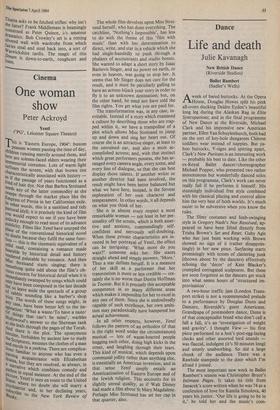Cinema
One woman show
Peter Ackroyd
Yentl
(`PG', Leicester Square Theatre) This is 'Eastern Europe, 1904': buxom Peasant women passing the time of day, children running merrily around them, and here are solemn-faced elders wearing their inimemorial costumes. Lots of warm light suffuses the screen, with that brown tint characteristically associated with history kind if the of passage of years functioned as a hair dye. Not that Barbra Streisand needs any of the latter commodity as she sweeps through the market place like the E, nipress of Persia in her Californian exile. In other words, this is a sanitised and tidy Pastoral idyll; it is precisely the kind of film Y,.°1-1 would expect to see if you have been unlucky enough to read most of its advance place Films like Yentl have usurped the P'ace of the conventional historical novel tiro doubt because they fulfil the same func- i°a — this is the cinematic equivalent of a bearable by historical detail and history rA.en.dered palatable by romance. And then miss Streisand starts singing; there is something quite odd about the film's ob- vious concern for historical detail when it is Immediately swamped by songs which could (let have been composed in the last decade '2!t us leave aside the spectacle of a group 1 rabbis sounding like a barber's shop ;10). The words of these songs might, in !case, have been better left to the im- 8ination: 'What a waste/To have a taste/ U4f things that can't be mine', warbles °IlYwood's answer to the Sherman tank Asrkd she leafs through the pages of the Torah. there is the plot. The eponymous theer°A.,ine, forbidden by ancient law to study Scriptures, assumes the clothes of a man and enrols in ,.0 o s in a yeshiva. There are complica- ;1„s familiar to anyone who has even a 'r sing acquaintance with Elizabethan a ania, but they are resolved, as always, in pat narrative which combines comedy and picture in equal measure. At the end of the s,"nre, Yentl is seen en route to the United 'its where no doubt she will marry a JPs chiatrist and, in her declining years, 1.,uooks.oscribe to the New York Review of
The whole film devolves upon Miss Strei- sand herself, who has done everything. The catchline, 'Nothing's Impossible', has less to do with the theme of this 'film with music' than with her determination to direct, write, and star in a vehicle which she had single-handedly to push through a phalanx of accountants and studio bosses. She wanted to adapt a short story by Isaac Bashevis Singer, and no power on earth, or even in heaven, was going to stop her. It seems that Mr Singer does not care for the result, and it must be peculiarly galling to have an actress hijack your story in order to fly it to an unknown destination; but, on the other hand, he need not have sold the film rights. You get what you are paid for.
The transformation was, in any case, in- evitable. Instead of a story which examined a culture by describing those who are trap- ped within it, we have a trampoline of a plot which allows Miss Streisand to jump up and down and sing her heart out. Of course she is an attractive singer, at least to the untrained ear, and also a most ac- complished actress; and, with that instinct which great performers possess, she has ar- ranged every camera angle, every scene, and every line of dialogue, so that she can best display those talents. If another writer or another director had been involved, the result might have been better balanced but what we have here, instead, is the fervent exploration of her own character and temperament. In other words, it all depends on what you think of her.
She is in almost every respect a most remarkable woman — not least in her per- sonality off the screen, which is both asser- tive and anxious, commandingly self- confident and nervously self-doubting. When these private characteristics are in- vested in her portrayal of Yentl, the effect can be intriguing: 'What more do you want?' someone asks her. She stares straight ahead and simply answers, 'More.' Thus a star defines herself. It is a measure of her skill as a performer that her transvestism is more or less credible — cer- tainly she is no worse than Dustin Hoffman in Tootsie. But it is precisely this acceptable competence in so many different areas which makes it impossible for her to excel in any one of them. Since she is undoubtedly capable of such excellence, her own ambi- tion may paradoxically have hampered her actual achievement.
In all other respects, however, Yentl follows the pattern of an orthodox (if that is the right word under the circumstances) musical — lots of warm-hearted people hugging each other, doing high kicks in the street, and laughing through their tears. This kind of musical, which depends upon communal jollity rather than anything else, is essentially an American invention, and in that sense Yen'', simply entails an Americanisation of Eastern Europe and of the Jewish religion. This accounts for its slightly unreal quality, as if Walt Disney had made a film about St Mary Magdalene. Perhaps Miss Streisand has set her cap in that quarter, also.










































 Previous page
Previous page